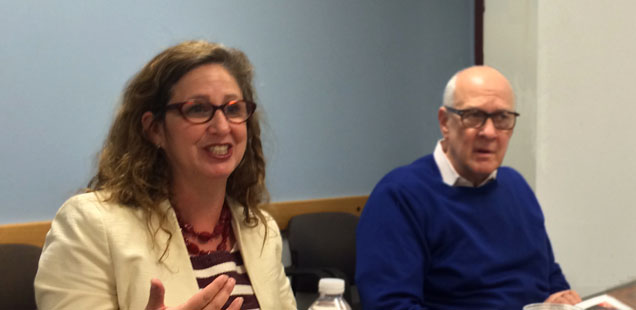October 28, 2014 — Dahlia Lithwick, senior editor at Slate and a prominent legal analyst, expressed deep concerns about the relationship between the press and the U.S. Supreme Court, noting that the Justices have become “increasingly mistrustful” of news media.
“They think we are a bunch of gossips,” Lithwick told a Shorenstein Center audience. “Universally, they think that we get it wrong all of the time.”
She said that covering the high court is a “phenomenal beat,” but listed some profound challenges facing reporters, including the ways in which information is tightly controlled. Audio of oral arguments is frequently released at inopportune times and big decisions, such as the Affordable Care Act case, are announced in ways that make coverage difficult.
The Justices mostly ignore the legal press, she said, and even their speaking schedules are kept private. “The Court has long taken the posture that everything you need to know” about them is in the Justices’ opinions. Paradoxically, Lithwick noted, this means that the Court remains “uniquely dependent on the press” to communicate its activities, judgments and institutional meaning to the public.
Lithwick said that a relatively new phenomenon is the appearance of Justices on high-profile television shows, where they are effectively going over the heads of the Supreme Court press.
A worrisome trend, she said, is an “enormous uptick” in the fears being articulated by the Justices in their judicial opinions about the “terrifying feral beast” that is the Internet and new media. Many of the jurists believe that the “Internet just exists to make you a target,” she said, and their deep skepticism about any kind of public exposure stems in part from the perceived “humiliating” experience of their Senate confirmation hearings.
One of the exceptions to this fear of the new media ecosystem is Justice Ruth Bader Ginsburg, Lithwick said. Ginsburg is “gaming, kind of beautifully” multiple digital media channels to express her discontent with the current Court status quo, particularly around women’s issues.
Part of the Court’s overall communications problems — and the Justices’ inability to decide effectively on issues such as money in politics — can be attributed to a lack of diversity, Lithwick said. “You have nine justices who went to two law schools.” Many are from New York, and all have come out of the federal bench, executive branch and academia. She said the current Justices represent a “thoroughbred court,” with prolific writing and intellectual skills. “But I think we bred out a depth of experience.”
Article by John Wihbey and photo by Nancy Palmer of the Shorenstein Center.


